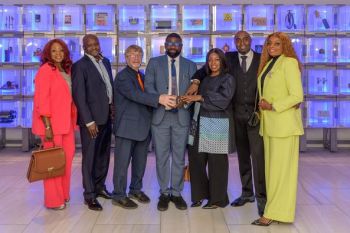NIGCOMSAT Wins the 2023 Impact in Society Award for Healthy Lives
By: Bella Currie
Last updated: Tuesday, 16 May 2023

Dr Lawal (centre of the picture) at the IET.
NIGCOMSAT, the Nigerian Communications Satellite, a project strongly supported by the University of Sussex, has been awarded The Institution of Engineering and Technology's 2023 Impact in Society Award for Healthy Lives. This recognition is a result of its successful telemedicine project, which addressed issues of low literacy and language barriers in remote health care delivery.
Dr Lawal Salami Lasisi, Head of Navigation Services at NIGCOMSAT Ltd, studied at the University of Sussex, where he completed his Master's and PhD under Prof Chris Chatwin. While at Sussex, Lasisi promoted digital inclusion, publishing papers, presenting at conferences, and running workshops that detailed the integration of wireless systems to bridge the digital hiatus in Africa.
Returning to Nigeria following his studies, Lasisi went on to develop the telemedicine project at NIGCOMSAT. One of the key challenges the project addressed was the gap between digital approaches to healthcare and low literacy levels. The team also contributed expertise in communication technologies, satellite communications, medicine, software engineering, mechatronics engineering, and health policy and management.
The University of Sussex assisted in securing the funding for the NIGCOMAT project, and Professor Chatwin invited Prof Gail Davey, Professor of Global Health Epidemiology at the Brighton and Hove Medical School, to provide important oversight in ensuring that the health objectives were deliverable and realistic. Without the support from the University of Sussex, this project may not have received appropriate funding to continue and succeed.
Prof Chris Chatwin, a professor of Engineering at the University of Sussex, who was involved in the project, expressed delight at the award from the Institute of Engineering and Technology:
“This award will have a significant impact on the UN-ITU and assist us in expanding this internationally supported activity into new projects allowing us to have an even greater impact on African and the Nigerian government’s social and educational policy on digital telehealth.”
The project involved a multidisciplinary team comprising of principal engineers from NIGCOMSAT, together with collaborators from various organisations, including the University of Sussex, Yale University School of Medicine, and the Federal University of Technology, Minna. The project leveraged NIGCOMSAT-1R to provide digital health inclusion, resulting in a viable advanced technological solution for telemedicine implementation.
The NIGCOMSAT telemedicine project demonstrates the impact of collaborative efforts in addressing social challenges. The project breaks down the barriers in telemedicine, making it possible to deliver remote health care services to underserved communities. The success of the project demonstrates the value of investing in research and development, with significant potential for transforming the health sector in Nigeria.

